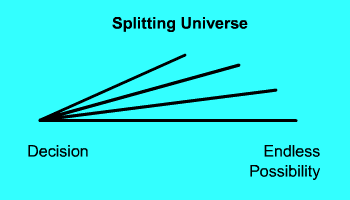-Excerpt from God Emperor of Dune by Frank Herbert-
Confusing, isn't it? If you follow the edges of the triangle slowly from apex to apex, the construction seems to be rational. When you view it as a whole, however, it is a seemingly impossible object to reconcile visually.
Your mind attempts to translate a series of two-dimensional lines into three-dimensional space. The triangle represents a challenge to your unconscious visual sensory apparatus as well as a confounding problem to your conscious intellect:
HOW IS THAT POSSIBLE?
Well, in the case of the triangle, go ahead and click on it to find out. This is a visual paradox: one of several kinds of impossibilities. Paradoxes in general, however, are a different story.
An unspecified or uncategorized paradox is defined as an apparent contradiction, which exists despite the inclusion of mutually exclusive rules regarding the nature of the subject.
Yikes! That's a bit fuzzy. It's a lot easier to explain with pictures like this:
 The platypus is a biological paradox. According to our once hard-and-fast rules regarding animal classification, an animal could only belong to one category, such as a reptile OR a mammal. The platypus appears to be both at the same time. This goofy-looking little fellow challenged the entire zoological world.
The platypus is a biological paradox. According to our once hard-and-fast rules regarding animal classification, an animal could only belong to one category, such as a reptile OR a mammal. The platypus appears to be both at the same time. This goofy-looking little fellow challenged the entire zoological world.
That's what paradoxes represent: Challenge. Shaking us out of our routine and forcing us to re-analyze and interpret supposedly unmitigating truths.
When we turn to the possibility of time travel, we discover a paradox gold mine. With the introduction and continued research on Einstein's Theory of Relativity, we find compelling evidence that time is not an immutable force which strings us helplessly along. It may someday be possible to travel to Shakespeare's England, or the country home of your great-great-great-grandchildren. A fabulous possibility, but wait:
 We need to learn the rules before we can run off traveling faster than the speed of light. The problem is, there are no definitive rules regarding time travel-only theoretical information. Thus, each challenge that a time travel paradox poses may potentially reveal the answers we seek, or prove to be simply an exercise in contemplating cosmic conundrums.
We need to learn the rules before we can run off traveling faster than the speed of light. The problem is, there are no definitive rules regarding time travel-only theoretical information. Thus, each challenge that a time travel paradox poses may potentially reveal the answers we seek, or prove to be simply an exercise in contemplating cosmic conundrums.
First, we must consider whether or not time travel is possible within the boundaries of existing scientific knowledge. Generally, theoretical physicists fall into two categories on the subject:
NO! 
 (It's a pair of Docs get it? Doc Martens)
(It's a pair of Docs get it? Doc Martens)
 Sorry kids, no can do.
Sorry kids, no can do.
These scientists argue that time functions within specific parameters that forbid the movement through time in any divergent manner. This is often called the "chronology protection" theory, which has had advocates such as the famous Stephen Hawking.
Happily, however, there are those who say:
 YES!
YES!
These are the folks we're concerned with. Some paradoxes proposed by the theoretical possibility of time travel are presented below, as well as a listing of possible chronological constructs in which they could occur.
All paradoxes are concerned primarily with CAUSALITY, the metaphysical claim that each event is caused by a prior event. Time travel to the past and the future violates causality and creates paradox.
- Perhaps the oldest paradox to be considered is the GRANDFATHER PARADOX. Although a bit morbid, it demonstrates an interesting conundrum. If you had access to a time machine, what would happen if you traveled back in time and (let's hope) accidentally killed Grandpa? What would happen to you? Your parents? Your kids?
- A BILKING PARADOX violates causality all over the place, it is an assertion of free will which transcends the functionality of time travel. It is best explained by example:
A man builds a time machine from plans he received from a mysterious person years before. The man realizes that the stranger was himself, using the time machine to travel back and give the plans to his younger self. A bilking paradox would occur if the man built the machine, tested its reliability, and then refused to give himself the plans.
- Get your minds out of the gutter for SEXUAL PARADOX, a special violation of causality involving procreation. Example: A time traveler returns to his family's village three hundred years in the past. Unwittingly, he falls in love with an ancestor and fathers another.
- A REVERSIBILITY PARADOX concerns the laws of physics as we currently understand them. The equations that govern the physical universe work equally well with time flowing forward or backward. Causality is reinterpreted and can be violated in "back-flowing" time as well, creating a reflective phenomena which eventually compromises the original laws. In our time-set, when we drop a ball, it falls and bounces-gravity functions normally. However, in a back-flowing time frame, the opposite effect would occur, and the laws of gravity would be violated.
First, we will consider the BLOCK UNIVERSE. The block universe is a theoretical conjecture in which all events from the beginning of time until its end are completely predetermined. The concept of free will is obliterated in this theory, as each decision you make actually ceases to become a decision. If you stand in the middle of the street (kids, don't do it) and try to decide whether to go right or left, whichever conclusion you come to was inescapable. Time is simply a big book in which all our actions are written-and none of us has an eraser.
This universe is more than a little disheartening, as each of our seemingly earth-shattering life decisions become foregone conclusions. However, this is an important model, because it shows remarkable immunity to a paradox of any kind. A time traveler who kills his grandfather or marries an ancestor was fated to do so, and can be accommodated by the inescapable timeline.

Next is the SPLITTING UNIVERSE. In this model, each decision we make not only has an impact, but actually creates a separate timeline independent of the first. You continue in the universe when you turn right, but another is spawned in which you went left.
This universal model creates a mind-boggling number of possible universes in which time travel may occur. However, in each separate reality, the rules of causality remain in tact, creating the possibility of paradox on multi-universal levels.

Finally we have the MUTABLE UNIVERSE, in which time travel would facilitate actual changes within a singular timeline. In this model, time progresses along a singular path, but lacks the predetermination of the Block model. Should a time traveler kill his grandparent, they would be blinked out of existence and the timeline would "repair" itself to reflect the changes in the present.
You can travel to the past, the future, and change whatever you want in a mutable universe. The problem is, when you get "home", things might not be the same as when you left.

